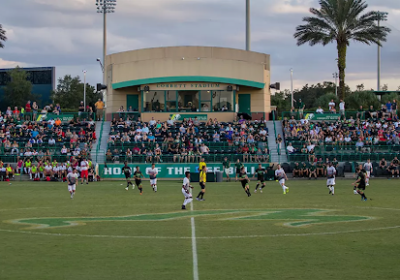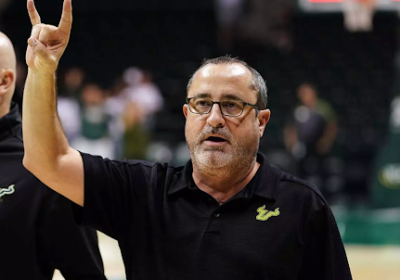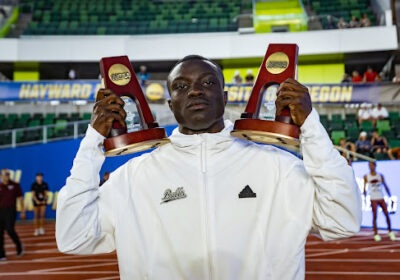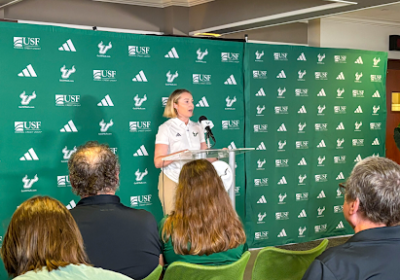Adjusting to life on the sideline

Michael Pierre was tabbed as the starting running back going into the 2014 season before discovering he had spinal stenosis.
ORACLE FILE PHOTO/TONY GORDON
When Michael Pierre went in for a routine physical before the beginning of summer practice this year, he mentioned to the doctors that his shoulder had been itching uncontrollably.
Pierre assumed it was a rash, but upon examining him, the doctors quickly became concerned.
“I told them and their eyes got wide and they started doing tests on me,” Pierre said. “They kept saying that my right side was weak. They did an MRI and that’s when they found out that I have spinal stenosis.”
Pierre was born with the condition, which causes the spinal cord to compress. This then leads to pinched nerves in the back and a vulnerable spine and neck. The condition could cause paralysis or even death if Pierre were to be hit with enough force in a weak spot on his back or neck.
At first, Pierre was told he could opt to surgically repair the spinal stenosis, but the risk involved was too high to take the chance.
“When he was diagnosed, we thought there was a way that we could get him back through surgery, but it was life-threatening,” running backs coach Telly Lockette said. “We didn’t want to take it that far and play with someone’s life. One hit and you can lose your life.”
When he learned of the severity of his condition, Pierre was crushed.
“That s— hurt,” Pierre said. “I was crying. It was my senior year and it was taken just like that and I didn’t even get a shot.”
He was desperate to make an impact for the Bulls in his senior season, especially after his chance was taken away in high school.
Pierre was on his high school football team at Agape Christian Academy, but never played a down of competitive football.
“I played the spring game (in high school), then I found out I couldn’t play my senior year because of grades; so I sat out my senior year,” Pierre said.
Not qualifying for the team dulled Pierre’s interest in football and he began thinking of different paths to pursue in his life.
He ended up graduating Agape Christian Academy with no set plans for the future, especially regarding football.
That all changed for Pierre when he received a phone call from his brother just after graduation.
“My brother called me and asked me if I wanted to play football again, so I said: ‘Sure, why not?’ So I flew out to California,” Pierre said.
Despite his lack of football knowledge and experience in games at or above the high school level, Pierre quickly adjusted to life at Golden West.
“I was fast and there weren’t too many fast people out there, so I just ran really,” Pierre said.
He won the starting job before the season began and used his raw speed to give fits to junior college defenses.
The 5-foot-10, 202-pound Pierre rushed for 1,160 yards and nine touchdowns on 227 carries over his two-year stint with the Rustlers, winning two bowl games in the process.
His success at Golden West drew offers from schools such as East Carolina, USF, Cal-Berkley, Texas Tech and Washington State.
While Pierre was back living back in his hometown of Winter Garden after he returned from California, Todd Fitch and former coach Skip Holtz went down to Agape Christian Academy to recruit him.
“They told me I could play right away because Darrell Scott was leaving, so I had a chance to win the starting job, so that’s why I came,” Pierre said.
Pierre worked toward learning the game and conditioning his body for Division I football over the next two seasons, which included redshirting in his first (2012).
He regularly stayed after practice or went through drills by himself to prepare himself for the starting role, whenever it would be presented to him.
“He always put in the extra work,” Lockette said. “Whether that was staying late to watch film, out there doing footwork drills. Anything that we told him he needed to work on in practice, he would stay late and work on it. He was just a good kid to coach.”
Coach Willie Taggart said Pierre’s hard work easily stood out from his teammates’.
“He was out here by himself sometimes, running drills in the heat of the day,” Taggart said. “You look out the window and think, ‘Wow, that’s a kid committed to getting better.’”
The fruits of his labors could be seen in the spring. The coaching staff was so impressed by his newfound knowledge and performance that they tabbed him as the starter before summer practice began.
“He ran the ball hard,” Taggart said. “He was our best pass protector as a running back. He understood the running game so much better and did a great job running the ball in the spring.”
But when it was discovered that he had spinal stenosis, the coaches were left to look for a new running back and Pierre had to find a new plan for his life.
“I didn’t come outside for about a month,” Pierre said. “Coach T told me he wanted me to be a (graduate assistant) instead of just staying in the house.”
Pierre barely interacted with the team throughout the summer as he struggled to come to grips with the realization he would never play the sport he had only just discovered a passion for.
“It was tough at first,” Lockette said. “His grades slumped during the summer, he didn’t really want to go anywhere. He didn’t want to be around the team because he felt like he ain’t really doing nothing to help, so that guilt set in on him.”
Taggart insisted Pierre join the staff as a graduate assistant so he could still earn his degree and keep his scholarship. Pierre said being a part of the team again has helped him come around, but it’s tough to be a permanent spectator.
“It’s really different because when I see a guy out there running the ball, I think: ‘Damn, I’m supposed to be out there,’” Pierre said. “It hurts, but ain’t nothing I can do about it, really.”
As a graduate assistant, Pierre helps with keeping statistics and coaching the running backs during practice. For home games, Pierre stands on the sideline and tries to provide encouragement for his teammates.
“I’m sure there’s still some days he wishes he could play, but I like seeing him on the sideline, getting excited with his teammates, congratulating them and pushing them along,” Taggart said.
With his playing days over, Pierre turned his focus toward helping the younger running backs with the knowledge he developed from his time at USF.
He isn’t sure if he wants to continue coaching after college, but he’s currently planning on graduating with a bachelor’s degree in criminology in December. Taggart invited him to stay on board with the staff when he begins to pursue his master’s degree in the spring.
Even though Pierre had his dream taken from him, Taggart said he tries to emphasize to him there’s more to life than the game of football.
“It’s important to be able to get your education and be able to carry your kids around when you have them and just live your life,” Taggart said.
In the meantime, Pierre is learning the ins-and-outs of coaching, but he still deals with the emotions that come with the abrupt end to a promising career.
“I feel like I don’t have a legacy,” Pierre said. “I didn’t get to prove myself. I finally had a shot to prove myself as a starter and everyone told me about how I was going to have a big season and be great, and then this happened.”








